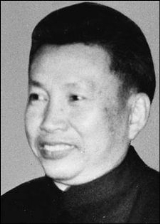
Pol Pot
Pol Pot born Saloth Sar, was the General Secretary of the Cambodian Communist Party (Khmer Rouge) and the Prime Minister of Democratic Kampuchea from 1976 to 1979.
Sourced
- We want only peace, to build up our country. World opinion is paying great attention to the threat against Democratic Kampuchea. They are anxious. They fear Kampuchea cannot oppose the Vietnamese. This could hurt the interests of the Southeast Asian countries and all of the world's countries.
- Interview with Elizabeth Becker (1978-12-22), quoted in "Pol Pot remembered", BBC News (1998-04-20)
- Everything I did, I did for my country.
- Interview with Nate Thayer, "Day of Reckoning," Far Eastern Economic Review (October 1997)
- I came to join the revolution, not to kill the Cambodian people. Look at me now. Am I a violent person? No. So, as far as my conscience and my mission were concerned, there was no problem.
- Interview with Nate Thayer, "Day of Reckoning," Far Eastern Economic Review (October 1997)
- Whoever wishes to blame or attack me is entitled to do so. I regret I didn't have enough experience to totally control the movement. On the other hand, with our constant struggle, this had to be done together with others in the communist world to stop Kampuchea becoming Vietnamese.
- Interview with Nate Thayer, "Day of Reckoning," Far Eastern Economic Review (October 1997)
- There's what we did wrong and what we did right. The mistake is that we did some things against the people—by us and also by the enemy—but the other side, as I told you, is that without our struggle there would be no Cambodia right now.
- Interview with Nate Thayer, "Day of Reckoning," Far Eastern Economic Review (October 1997)
- The first time I heard of Tuol Sleng, it was on the Voice of America. I listened twice.
- Interview with Nate Thayer, "Day of Reckoning," Far Eastern Economic Review (October 1997)
- I am in extremely bad health. The blood does not reach my brain. It hurts every day.
- Interview with Samkhom Pin (2 April 1998)
Attributed
- We did not yet have laws or order. We were like children just learning to walk.
- On the Democratic Kampuchea period, as reported by David Ashley (1995) and quoted in David P. Chandler, Brother Number One (1999)
- I was responsible for everything so I accept responsibility and blame but show me, comrade, one document proving that I was personally responsible for the deaths.
- Reported by David Ashley (1995) and quoted in David P. Chandler, Brother Number One (1999)
- "Only several thousand Kampucheans might have died due to some mistakes in implementing our policy of providing an affluent life for the people."
- Clive Foss, The Tyrants: 2500 Years of Absolute Power and Corruption, London: Quercus Publishing, 2006, ISBN 1905204965, p. 191
About Pol Pot
- Pol Pot makes a very powerful impression on those who hear him for the first time. After that, they want to come back... Those who attend his seminars feel enlightened by his teaching, his explanations and his vision... He's like a father to us.
- Khmer Rouge defector (1990) quoted in David P. Chandler, Brother Number One (1999)
- It is good that Pol Pot is dead. I feel no sorrow. Pol Pot was a Vietnamese agent.
- Ta Mok (April 1998), quoted in Nate Thayer, "Dying Breath," Far Eastern Economic Review (1998-04-30)
- He was always a good husband. He tried his best to educate the children not to be traitors. Since I married him in 1985, I never saw him do a bad thing.
- Pol's second wife, Mea Son (April 1998), quoted in Nate Thayer, "Dying Breath," Far Eastern Economic Review (1998-04-30)
